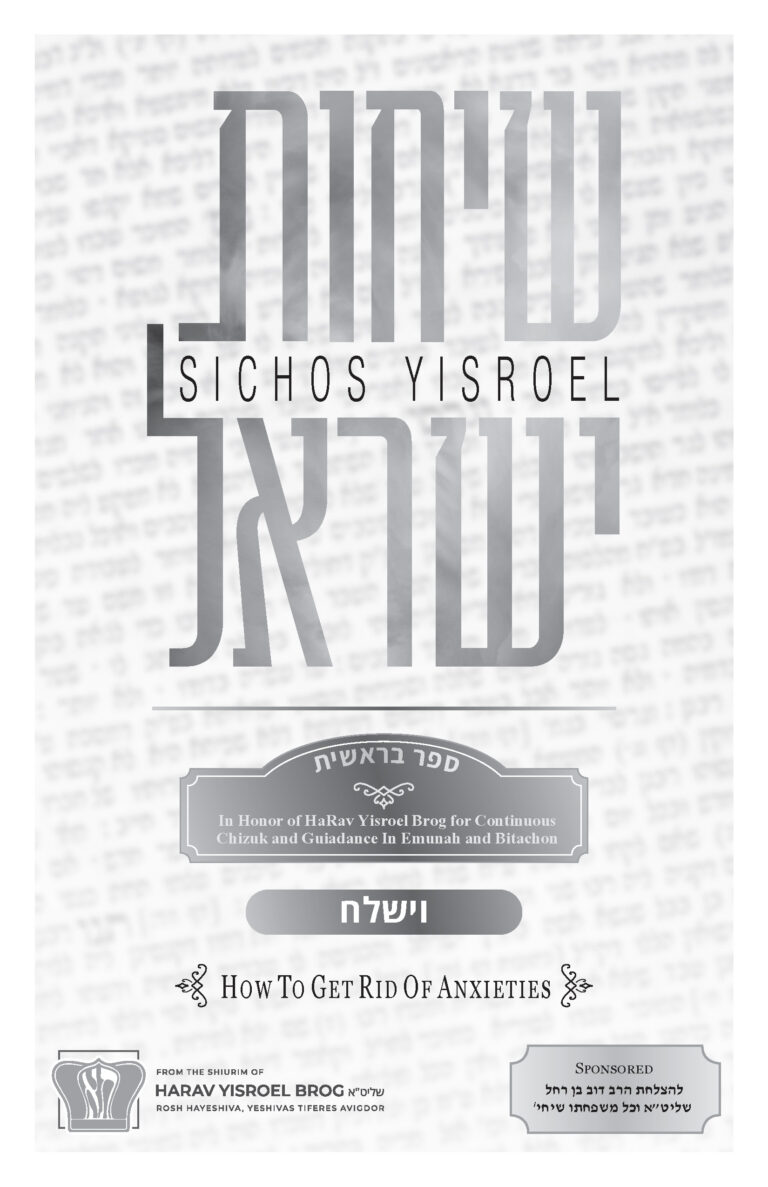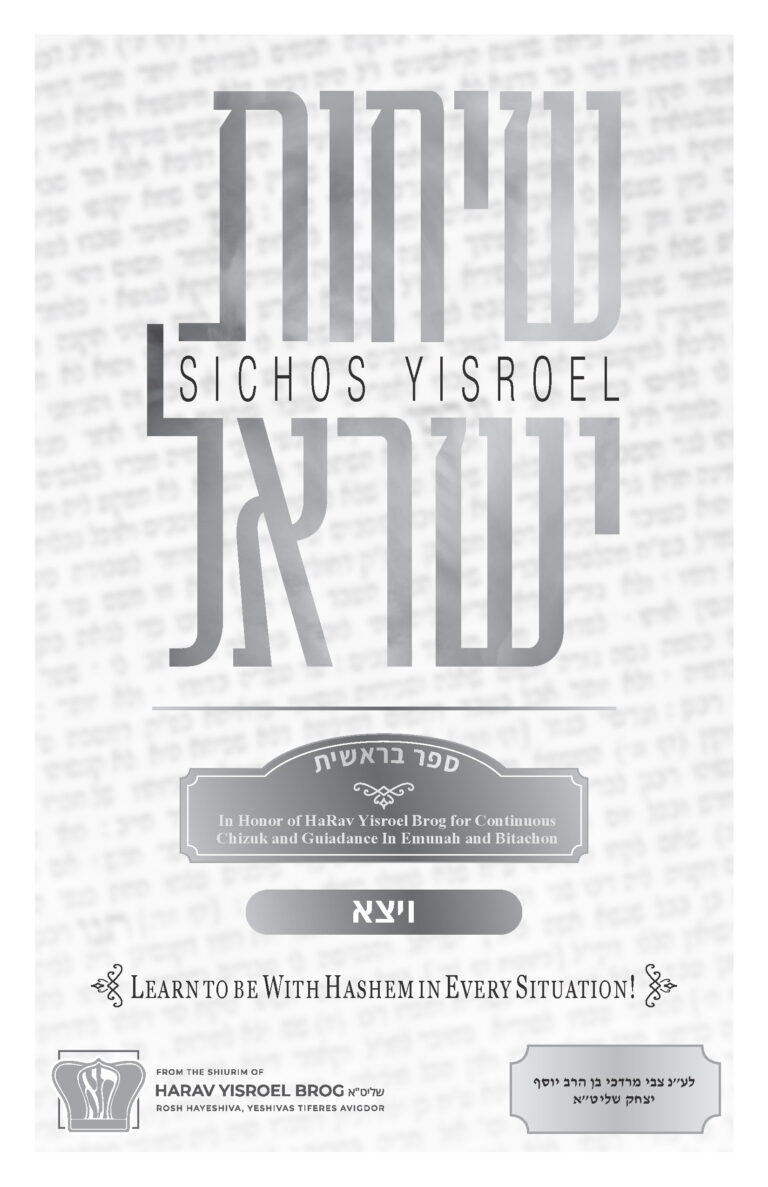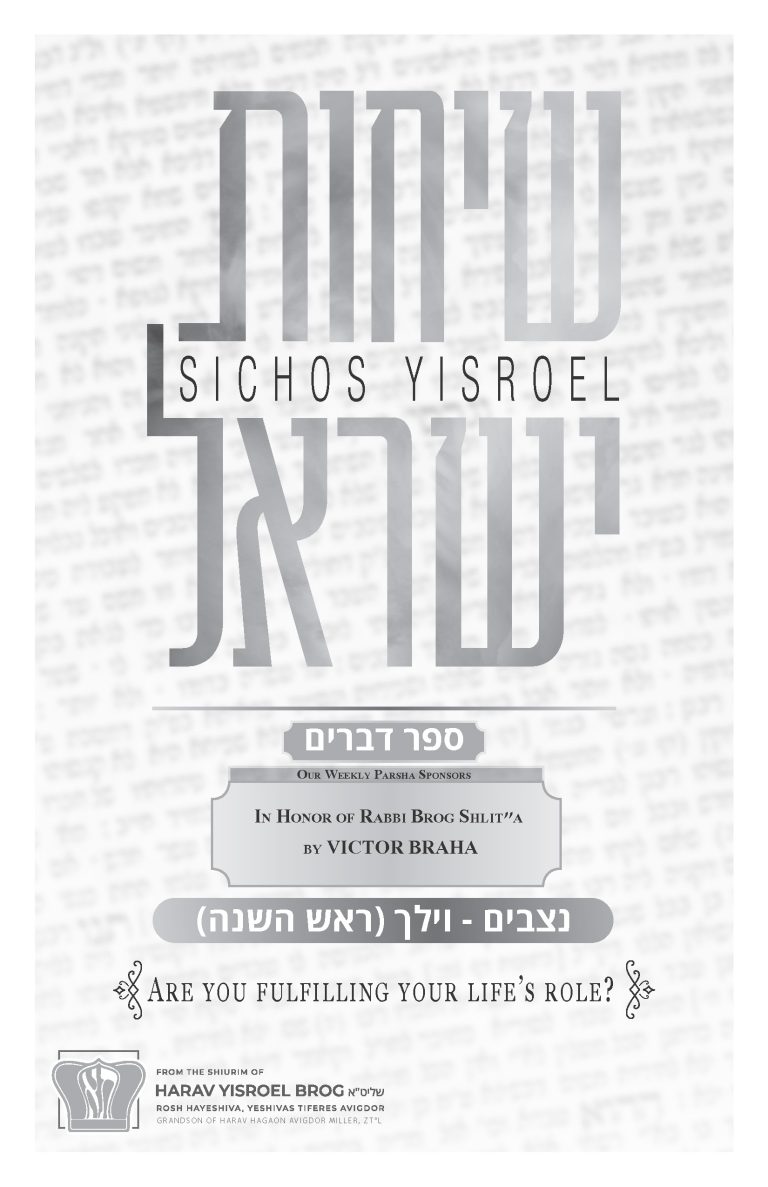Parshas Re’eh: Bring a Brachah Into Your Life
Sponsored
We Need Your Help to Ensure the
Future of Sichos Yisroel!
Consider sponsoring a shiur
Visit YTATorah.org
Shiur given in 5767
Brachah Comes When We Listen to Hashem
This week’s parshah is Parshas Re’eh, and the beginning of a new zman. We’re going to study the Gaon of Vilna on the first few passukim in Re’eh to get some insights into the subject.
Moshe Rabbeinu is talking, and he’s says: ראה, “See,” אנכי נותן לפניכם היום, “I am placing before you today, ברכה וקללה, “a blessing and a curse.” את הברכה אשר תשמעו, “the blessing that you should obey the commandments” (Devarim 11:26-27). Rashi translates אשר to mean al manas, on condition. Rashi says it’s a brachah al manas asher tishmau.
Now, you have to understand that Moshe Rabbeinu is talking about a specific event. Look in the first Rashi (v. 26). Rashi says there: האמורות בהר גריזים ובהר עיבל, the ones that were said at Har Grizim and Har Eivel. Does anyone know when the event of Har Greizin and Har Eivel took place? It took place only after they entered Eretz Yisrael. Moshe Rabbeinu wasn’t there already. Yehoshua ran the event of Har Greizim and Har Eivel, a famous event where they said brachos on one mountain and klalos on another mountain. Now Moshe Rabbeinu is talking about that event and he says, “See, I’m placing before you today brachah and klalah.” That means he told them about the event before it took place. And he’s saying: את הברכה, You will receive the brachah, אשר תשמעו אל מצות ה’ אלקיכם, which Rashi says is al manas, on the condition that you will listen to Hashem Elokeichem. You’ll get the brachah on the condition that you are mekabel the mitzvos אשר אנכי מצוה אתכם היום, that I am being metzaveh you today. והקללה אם לא תשמעו אל מצות ה’ אלקיכם, And you’ll get the klalah if you will not listen to the mitzvos, וסרתם מן הדרך, and you veer away from the derech אשר אנכי מצוה אתכם היום, which I have commanded you today, ללכת אחרי אלקים אחרים, to go and follow other gods, אשר לא ידעתם, which you did not know.
Let’s look at the words of the Vilna Gaon, who makes a number of diyukim.[1] He asks what was the message Moshe Rabbeinu was giving Klal Yisrael? He was telling them about an event that was going to happen. What was the purpose of that event? When it happens they’ll experience the event. It was a type of covenant. They entered this covenant, this bris with Hakadosh Baruch Hu. One is on Har Greizim and one is on Har Eivel. I want to tell you re’eh, I’m telling you a whole parshah called re’eh about this event. What’s going on over here?
The Gaon also points out that Moshe said: What am I going to show you? I’m going to tell you about brachah and klalah. Why didn’t he say tov v’ra, good and bad, or chaim vemaves, life and death? Why did he specifically use the term brachah veklalah?
Sechar and Onesh Only Come in Olam Haba
The Gaon of Vilna says as follows: Hakadosh Baruch Hu’s message to Klal Yisrael was that there are two derachim before them, the derech hatov and the derech hara, and they should choose which derech they want. Everybody is on a pathway of life, every single person is on the road of his own choice. Now, you have to know that שכר מצוה בהאי עלמא ליכא, there is no reward for a mitzvah in this world (Kiddushin 39b). Hashem said that you don’t get sechar for mitzvos in this world. When you see somebody who seems to be getting sechar, if he’s a good person, it’s probably not sechar, just dividends. And when you see a rasha getting what seems to be a good life, it’s a special exception. Hashem says, “I pay sechar to My enemy leha’avido, to destroy him.” You have to hear this yesod. It’s a noradike yesod. Every time I look at a rasha or I read in the paper about a rasha who died, and the guy owned a football team, or he owned a basketball team – he was a wealthy guy bikitzur – I always remember the passuk at the end of Parshas Vaeschanan (Devarim 7:10). It says there Hakadosh Baruch Hu pays His enemies in this world in order to destroy them. That’s all. Very simple. Very easy job. That’s the exception to the rule. The passuk says, ומשלם לשונאיו אל פניו להאבידו, he pays his enemy in his lifetime to destroy him. The passuk continues, לא יאחר לשנאיו, when it comes to His enemy, Hashem does not delay paying up, אל פניו ישלם לו, He pays him up al hapanim, on the spot! You have to hear that. You have to get that in your kishkes and see that klor.
And therefore if you’re doing a good job and you’re not getting sechar, that’s a good sign. It’s a sign that you’re doing a good job. Hashem likes you. You see a rasha and he seems to be having a good life, that’s because, בחייו משלם לו גמולו הטוב, during his lifetime he gets good reward, כדי להאבידו מן העולם הבא (Rashi ibid).
Showing Hashem Our Commitment
Now, if somebody is zocheh, Hakadosh Baruch Hu gives him the ability to earn a sechar in olam haba. Hashem could make life easier for a person. But sometimes it doesn’t go easy, and a person can’t understand why it’s like that. You say to yourself, “I want to do the right thing, so why is Hashem making it hard for me?” And the answer is for two reasons. Firstly, by making your life easier before you’ve committed yourself to keeping Torah and mitzvos and proving your mettle, you diminish your sechar. Only once you are fully committed to Torah and mitzvos, can you still receive your sechar even if it’s easy. Secondly, when a person makes the first step, Hakadosh Baruch Hu makes it rough for him because He wants him to earn his sechar for his commitment. If you knew that if you learned Torah all your needs would be taken care of, what kind of commitment to learning Torah would that be? You wouldn’t get any sechar, because sechar is determined based on the tza’ar, לפום צערא אגרא, according to the labor is the reward (Pirkei Avos 5:23). You only get sechar based on the tza’ar. That’s the formula. Let’s say a guy commits himself to learning even if it’s difficult and he does it. So now Hashem knows he’s committed.
The Gaon says that the ikar onesh for aveiros, the ikar tashlum for aveiros, is in Gehinom. He doesn’t say there’s no onesh for aveiros in this world.
Someone Who Doesn’t Appear Successful May Still Be Blessed
Therefore, the Gaon explains, Moshe used the terms brachah and klalah. You know what “brachah” means? You’ll be blessed. Blessed means, for example, that they bless you to have good children or to have wealth. Now even if a guy has good children or wealth, does that mean he’s going to see the goodness of those children or enjoy that wealth in this world? Not necessarily. It’s a brachah. Brachah means it’s a potential. It’s a source. That’s what brachah is. That’s why a person who has a brachah in this world will benefit from that brachah, but he will only harvest the produce of that brachah in the next world. The pleasure that people get out of good children in this world, is not necessarily the sechar of having good children. The sechar of good children will mainly be recognized in the next world.
We see it fakhert with the klalah as well. Here is a person who is mekulal, cursed. Let’s say a person, nebach, is in dire financial straits. A guy loses his job, chas v’shalom. He’s currently depressed. That doesn’t mean his troubles are over. It could get worse for him. Today he’s anxious, but what he’s going to look like in three months may be an entirely different story. His parnassah situation may get much worse.
That’s why Moshe Rabbeinu chose the words brachah and klalah, because a person doesn’t necessarily see the tov or ra immediately. Tov v’ra refers to the future, the receiving of the end result.
We are foolish because we think: “If I had money, I’d be fine, or, if I have $100,000 in my pocket, I feel like I’m a muchzak on it, I am in possession of it. It’s mine.” But because I have the brachah today, because I have good kids today, doesn’t mean I’m going to see nachas from them in the future.
Tov v’ra is the end result. Brachah and klalah is the initial garin, the seed for the potential. That’s what brachah veklalah are.
Moshe Rabbeinu gave them an overview of how to view brachah and klalah. If you see a talmid chacham today and you don’t see the guy looking successful, it could be that today this guy is a gebentched mentch. He’s a blessed person! He’s a very blessed person. He hasn’t seen the tov yet. He’ll see the tov later on. But it doesn’t mean to say he lacks the brachah.
I’ll tell you where I see this very often. You’ll go to most yeshivaleit, most of whom are truly blessed. You’ll find that they have much less money than most other people out there. Yet most of them are reasonably happy, satisfied and don’t think they have it that bad. And the opposite is also true. You go into the world, the working world, and you often see that people are struggling. No matter what they have, most people don’t think they have enough. You talk to a guy for a few minutes. You know how the conversation goes? “Parnasah could be better.” That’s what the average guy tells you.
Every Person Has Free Choice
Now why does it say the word nosen – אנכי נותן לפניכם? Nosen means to “give” in the present tense (see Kol Eliyahu, footnote #1). What does “I am giving you a present” mean? If you choose to be mekabel, to do mitzvos, Hashem gives you brachah. It’s totally in your hands: הכל בידי שמים חוץ מיראת שמים. It means you’ve chosen a brachah. If you don’t do kabalas mitzvos, you’ve chosen a klalah. Now what is the idea of נֹתֵן, I am “giving” you? What is the idea from the word “giving”? The word “giving” is used for a gift, but the concept behind “giving” is that it’s a gift in the present time. It’s a gift right now. Now, we usually say “I’m going to give you a gift,” or “I gave you a gift.” Usually it’s not “I’m giving you a gift right now, in the present moment.” So, generally speaking, if I say, “I’m giving you a gift” it means to say, “I’m going to give you a gift in the future.” So the question is: what does אָנֹכִי נֹתֵן mean (ibid)? I am “giving you a gift”? Here it sounds like it’s in the present tense.
The Vilna Gaon says it’s because there’s a hava mina that people would think their free will would be affected. If a person only had a choice at the beginning of his life to choose good or bad and he chose bad, he’d basically be stuck. Even if afterwards he wanted to change, it would be too late. If you ask most people who have made wrong choices in life what they think their chances of changing their lives are, they’ll tell you: very little. I’ve seen many a bum who were told by people that they could change, and you know what they said to me? “I can’t change. Maybe I could have changed. I made the wrong choices. It’s a little too late and a little too little.” That’s the mistake, says the Gaon.
The Vilna Gaon says, Moshe Rabbeinu is telling Klal Yisrael: “Hakadosh Baruch Hu is saying you have a choice kol yamecha, all your days of your life until you stop breathing, until the yom hamisah. You have a takanah, you have an option. You are not stuck. Today is a new day. The gift of choosing what to do is yours for the taking. It’s in a matzav of present tense regardless of what yesterday was.”
Past Choices Don’t Influence Our Current Ones
So what’s the counter? A person is going to say, “Okay, so I’m going to choose to do good from now. But lema’aseh, I’ve got a boatload of aveiros. I accumulated lots of baggage. I have no takanah from that baggage.” The answer is: the pasuk says hayom. What is the concept of hayom? Hayom means: I’m placing before you hayom, which means “this day.” The Vilna Gaon says you have to know, understand, and believe what it says in the gemara about teshuvah: When a person does teshuvah, it’s like קטן שנולד דמי, he’s like a child that is just born. A child that’s just born also had an existence before he was born. He’s been around for a while but it was a totally different atmosphere. That was in the womb. He was then a sea animal. Now he has become a dry land animal.
You have to know that the first thing to tell yourself is: I’m starting over from hayom. Today! I’m a new person today.
Hashem Allows Us to Freely Choose to Do Good
Ah, then the question is: “Okay, what am I going to do with my yetzer hara?” Like it says in Chazal, if a person did an aveirah, he should be pained simply because he did an aveirah. But you know what the greater pain is? That he opened up a pesach. He got involved with the mafia! They say an amazing thing about the mafia. If you don’t bother them, they don’t bother you. But if you borrow money from them, even $10, then once you borrow, you open an account with them, and then you’re finished. Now they own you. They come to you to pay them for protecting you. They’re never finished with you. So Hashem says to the person who involved himself with the yetzer, אנכי נותן לפניכם היום. You know what anochi reminds us of? אנכי ה’ אלקיך. Do you know what אנכי ה’ אלקיך means? “I am Hashem. I am the only One that can save you. Just like I took you out of Mitzrayim.” Anochi Who took you out of Mitzrayim. You couldn’t get out of Mitzrayim. You were so locked up in Mitzrayim. You were on the 49th level of tumah. I took you out of there. ראה אנכי נותן, Who is giving you this matanah. Do you know who is giving you this breirah every day? Do you know who is waiting until the day you die? You know who is making you a קטן שנולד דמי? It’s Anochi – Hakadosh Baruch Hu. Hashem is saying אנכי אהיה עמך, I am going to be with you. Don’t be afraid of the yetzer hara. Like it says, יצרו של אדם מתגבר עליו בכל יום והקב”ה עוזרו, Hakadosh Baruch Hu assists him.
Then the Gaon presents a mashal where, let’s say a guy goes and buys some goods from his friend and the guy is trying to push the sale on him. So what does the buyer think? Why is this guy trying to unload something valuable? If somebody is offering you something and pushing it on you, usually there’s a problem with it. Usually, a guy with something good and valuable doesn’t want to sell so easily, and the buyer has to convince the seller to sell it. The Gaon says: A guy might think there must be something wrong with this mekach that Hashem is selling me because Hakadosh Baruch Hu is trying to influence me with all types of appeasements and all kinds of things to get me to buy what He’s selling. So, Hakadosh Baruch Hu says: I’m placing it lefneichem. You know what “lefneichem” means? I’m not forcing you. I didn’t say “lachem.” I said “lefneichem.” You hear what it says in the passuk? If it would say הנה אנכי נותן לכם it would mean: I’m giving to you. That means I’m stuffing this gift down your throat. By saying “lefneichem,” I’m saying that I’m placing it “before you.” You know what “before you” means? “Here it is. Do you want it? You’ve got to reach out and take it.” If it would say “lachem,” it would mean, “I’m giving it to you. I’m putting it in your hand. Here it is.” Instead, Hashem said, “I’m putting it lefneichem.”
Then the tachbulah of the yetzer hara comes and says: “Okay. Very nice. If the whole world is tzaddikim, then I can become a tzaddik also. Everybody is frum, I’ll become frum. Everybody is sitting and learning, I’ll start sitting and learning. But what if I’m going to be the only guy doing it?!”
The Vilna Gaon says: Hakadosh Baruch Hu says, re’eh, see. It doesn’t say re’u. Re’u is plural. Re’eh is singular. Do you know why it says re’eh? When you’re making choices for your life, you must be an individualist. You have to be someone who thinks for himself. Don’t look at the rest of the world to see if they’re tzaddikim or reshaim. When you make choices for yourself, choose as an individual. Every life choice you’re going to make, you have to make as a yachid. Not as part of a group. Not because he’s frum, therefore I’m also going to be frum.
In conclusion, here is a synopsis. Anochi means even if you’re stuck with the yetzer hara, anochi, remember that I, Hashem, took you out of Mitzrayim. I’m going to take you and I’m going to be with you. Don’t fear the yetzer hara. It’s overpowering, but I don’t care how strong it is. Anochi, I, Hashem, made him. That’s My guarantee.
Nosen, its constant, a continuous choice, in the present tense. What about forcing you to take it? There is no forcing. It’s lefneichem. You’ve got to take this gift as an opportunity.
An Example of Having to Make a Choice
Not long ago, we had a young man who came here bederech nes. This guy was always dreaming of going to a beis medrash. For some reason, the yetzer hara got involved with him and he didn’t go. So what happened? Hakadosh Baruch Hu orchestrated that the fellow should end up here. He told me that he had told Hashem that if he could find a place with every one of the many conditions he was looking for, then he’d come. He said he found that here, so he came. He stayed here for a few days. It was unbelievable. Then he said he was leaving for a bit, but he promised he’s coming back. You know what I told him? “You’re not coming back.” He replied, “No, no, I really am. Rebbi, I really am. I’m coming back.” I told him, “You know why you are not coming back? Because Hashem always places the choice lefneichem. You have to take the opportunity.”
I called him up last Thursday night. I sensed that something was wrong. I said, “My friend, you’re backing out.” He said, “No. Rebbi, didn’t I tell you? I’m not backing out. I’m thinking about it.”
I said to the fellow, “Do you understand that you’re in a very big predicament here. You promised me this was your dream.” One of his biggest initial impediments he had was that his parents were very anti. But when he came here that week, his father called me and said, “I want my son to learn in yeshivah.” He told the kid, “I want you to get a rebbi. You need a rebbi.” It was unbelievable, not stam. Hashem took away from him every me’akev, every impediment, and yet, he couldn’t make up his mind.
The bottom line is: you have to make a choice. Hashem always puts it lefneichem. He never pushes it down your throat. Hashem sets it before you. That’s what lefneichem means. It’s set before you and you have to reach out and take it. It’s very sad what happened to him.
Then that young man tells me he’s involved with a gevaldike shidduch. The girl wants somebody who is sitting and learning. So he told her, “I’m going to sit and learn.” I told him, “But I thought you changed your mind about learning?!” He said, “We’ll see how the shidduch goes. We’ll see. I want to sit and learn – no shaila about it.”
A mentsch has to know and remember: hayom. Hayom means don’t be afraid from baggage because you’re כקטן שנולד דמי.
What is the klalah? Literally, a curse means deficiency. That’s what it is. A person who is cursed means he lacks something basic, so he’s a ‘cursed’ fellow. That’s what we call the person. If the guy says something should happen to you, it means I want your health to become diminished or your wealth to become diminished or whatever it is. Klalah comes from chisaron.
Now the Rambam in Hilchos Teshuvah (פרק ה הלכה א-ב) writes about this halacha as follows: רשות כל אדם נתונה לו, Hashem places the option before every single individual, אם רצה להטות עצמו לדרך טובה, if he wants to turn to derech tovah, a good derech, ולהיות צדיק הרשות בידו, then the door is open. ואם רצה להטות עצמו לדרך רעה, And if he wants to turn to derech ra’ah, ולהיות רשע הרשות בידו, the reshus is in his hands. And he says, don’t allow the thought to enter your mind which tipshei umos haolam, foolish goyim ורוב גלמי בני ישראל, and golamim, most idiots who are Jewish, and maintain the same opinion, say: שהקב”ה גוזר על האדם, that Hashem decrees upon a man, מתחילת בריאתו, from the beginning of his creation, להיות צדיק או רשע, to be a tzaddik or a rasha. אין הדבר כן, it’s not so. The Rambam (הלכה ג), continues: ועיקר זה עיקר גדול הוא, this is a great principle, והוא עמוד התורה והמצוה, and this is a foundation of the Torah and mitzvos. And what’s the source? He brings two pessukim. שנאמר ראה נתתי לפניך היום את החיים, as it says, “See, I am placing before you today life, etc.” That’s in Parshas Nitzavim where it says ראה נתתי לפניך היום את החיים ואת הטוב את המות ואת הרע, “See, I set before you this day life and goodness, death and evil” (Devarim 30:15). And the second passuk says: ראה אנכי נותן לפניכם היום ברכה וקללה – the passuk in this week’s parshah (ibid). כלומר, which means to say, שהרשות בידכם, the reshus is within your hands, וכל שיחפץ האדם לעשות, anything a man chooses to do, ממעשה בני אדם, whether good or bad, is up to him. That’s it. That doesn’t mean you shouldn’t daven to Hashem. That doesn’t mean you shouldn’t reach out to Hashem. A mentsch has to know this is a very important principle a person must always remember.
Teshuvah For Improper Viewpoints
Now the Rambam says in another halachah that when a person does teshuvah, he has to do teshuvah not only from his sins. He had to do teshuvah also from his negative hashkafos. His philosophies, his deos raos. The Rambam says (פרק ג הלכה ז) as follows: אל תאמר שאין תשובה אלא מעבירות שיש בהן מעשה, you shouldn’t say that the one only needs to do teshuva for aveiros, which involve action. I want everybody to look up these Rambams later on. This is a very important Rambam. He says, כשם שצריך אדם לשוב מאלו, just like a person needs to do teshuvah for כגון זנות, immorality, gezel, geneivah, thievery, robbery, כך הוא צריך לחפש בדעות רעות, similarly, one needs to search his wrong, bad perspectives, שיש לו, that he has, ולשוב מהם, and do teshuvah for them. He has to do teshuvah for all kinds of things, whether that means for getting upset, or having animosity, jealousy, competitiveness, lightheadedness, pursuing money, pursuing honor, pursuing food, or pursuing pleasures. מן הכל צריך לחזור בתשובה, a person has to do teshuvah for all things. ואלו העונות, these sins are much more serious and more difficult than those sins that involve a ma’aseh because when a person is sunk into pursuing money, kavod, and pleasures, קשה הוא לפרוש, it’s very difficult for him to get out of them. That’s called יעזב רשע דרכו, “Let the wicked give up their ways” (Isaiah 55:7).
Now, in the next halachah (פרק ז הלכה ד), after the Rambam says this, he says a strange thing. He says as follows: A person shouldn’t imagine that a ba’al teshuvah is much more distant from Hashem than a tzaddik because of all the baggage that he has, all the aveiros that he did and accumulated. He says it’s not so. But rather he says he is ahuv, he is beloved and nechmad, לפני הבורא וכאילו לא חטא מעולם. It’s like he did not sin whatsoever. ולא עוד, not only that, אלא ששכרו הרבה, Hashem is going to give him a lot of sechar. Do you know why? שהרי טעם טעם החטא, he tasted sin, ופרש ממנו, he separated from it, וכבש יצרו, and he conquered his yetzer hara. That’s what a mentsch has to know.
The Rambam is telling us an interesting thing here. Teshuvah is something you have to do not only for ma’asim but even from perspectives, hashkafos.
Here is a fellow who calls me up. He tells me that his wife honestly does not mean to criticize him or be critical of him whatsoever. But whatever comes out of her mouth, he takes as criticism. He’s very upset. Unbelievable. I told the guy that if his wife doesn’t know she’s critical, what should you do? If she knows she’s critical, she would go to a therapist and they could work on not being critical. But if she says, “Good morning,” and you decide that’s critical, and she says she’s being polite and not critical, so who has to fix himself? Not your wife. You have to fix yourself. It’s very hard for a person to do that. A person has to fix himself up.
Then he says, this is mamash what he says. “I don’t think I can change my thinking processes. I can’t change my thinking processes.” No, you can change your thinking process! And don’t think, says the Rambam, that you’re gone. You’re not gone. This is mamash what the Vilna Gaon is telling us, too.
The Message For Chodesh Elul
This is the message that Moshe Rabbeinu told us re’eh and this message always comes on the eve of Rosh Chodesh Elul. You always get this message every year on the eve of Rosh Chodesh Elul. You’ve gone through the last eleven months. Now it’s the last month of the year. There’s what to be salvaged and there’s what you can salvage. There is a lot to save. And it’s hayom. You have to know it’s not pashut. There’s a concept of שלושים יום בשנה חשובים שנה, thirty days in the year is a year. There’s a concept of a week being considered a year. There is a concept of even a day being a year. Of course, a year comprising 365 full days, that’s the best year! But if it’s a thirty-day year, a seven-day year, a day-year – everything has in it a different aspect of a year.
Let us be mechazek ourselves to prepare ourselves for the beginning of the zman. This zman we should keep these focuses in mind. This is a powerful Vilna Gaon that everybody should study. It’s a synopsis. Remember the messages: Re’eh, anochi, nosen. Do you know why? Because in your life every one of you is going to have an opportunity to speak and of course everybody could say these things, but now we want to get a perspective.
Maybe you’ll tell somebody, do you know why Moshe Rabbeinu told us an amazing shmooze on one of the final days of his life? Moshe Rabbeinu prepared Klal Yisrael how to counter every ta’anah that the yetzer hara would bring. This is a ta’anah that everybody has. People say, “Rabbi, I want to do this.” Okay, so that is asking for klalah. A bachur tells me he wants to chill out. Klalah. The teretz is he tells me, “I don’t feel the klalah right now.” I say, “Okay. You’re like the guy who lost his job and doesn’t know that he’s never going to get a job anywhere else in his life. But he thinks he has a few dollars in the bank, so right now he says, ‘Okay. I lost my job but I’m not cursed yet.’ Oh no, no no. You’re cursed my friend. The ra you don’t have yet. The ra you haven’t tasted. But the klalah, that you have.”
Let’s remember these important lessons and apply them in our lives and especially during the upcoming Chodesh Elul. Have a wonderful Shabbos.
The Bottom Line
In one of his final addresses to Klal Yisrael, Moshe Rabbeinu prepared them to be able to face every ta’anah that the yetzer hara could bring to cause a person to stumble and sin. The message is neatly coded in three words – Re’eh, anochi, and, nosen lefneichem. Re’eh: We each have to make an individual, continuous attempt to choose good. We have to continuously redirect ourselves toward good by reminding ourselves that bracha is the result of us listening to Hashem. Anochi: If the challenge seems insurmountable, we should remember that Hashem is on our case. He encourages us by saying, “I took you out of Mitzrayim and I will help you overcome the yetzer hara.” Another way that Hashem encourages us to choose right is that we should never fear the spiritual baggage we carry from our past deeds. If a person fails, there is always new hope – daily – to choose to do better since daily, each of us is like a newborn child. Nosen: We must choose to do good in order to earn the major part of our sechar in olam haba. Lefneichem: while Hashem can lay the opportunity to do good in front of us, we must positively act and do good. Reiterating the importance of free choice, Hashem told Moshe to remind Klal Yisrael of the brachah and klalah that will indicate where we are headed – there is potential blessing or curse that is the fruit of our choices. The main sechar or onesh is not in this world. This enables us to have free choice, the opportunity of the two derachim that stretch out before every one of us. As a gift from Hashem, a person can get more brachah in their life. How? By not limiting their commitment to trying to grow. A person should try to grow and see how Hashem offers a test, which if they pass it, earns a person Hashem’s helping hand and brings a lot of brachah into a person’s life.
[1] ז”ל הגר”א בס’ אדרת אליהו פ’ ראה, ד”ה נתן: במתנה שהקב״ה מסלק ממנו ואמרו (ברכות ל״ג ע״ב מגילה כ״ה ע״א נידה י״ו ע״ב) הכל בידי שמים חוץ מיראת שמים. ושמא תאמרו הבחירה ניתן לאדם בימי בחרותו אבל לא אחר שהורגל במעלליו הקשים לכן אמר היום בכל יום ויום הרשות נתונה והבחירה בידו לילך בדרך טובים. ואמר ברכה וקללה. ולא אמר טוב ורע. כי נמצא צדיק ורע לו רשע וטוב לו. לכן אמר ברכה וקללה. כי הברכה לא תגיע תיכף רק התכלית הוא טוב כמו שמצאנו יעקב בירך את אפרים וידגו לרב בקרב הארץ ולא נתרבו תיכף. ולכן בחלוקת הארץ אמרו בני יוסף אל יהושע מדוע נתתה לי נחלה גורל א’ וחבל א’ ואני עם רב עד אשר עד כה ברכני ה’. ובכל הפקודים לא מצאנו שהיו מספר פקודיו יותר מכל השבטים. ועוד הלא אמר לרב תרבה נחלתו. ורז״ל תרצו משום טפלא (ב״ב קי״ח ע״א) ופי’ רש״י דחוק אמנם נראה כי ברכת יעקב היה וידגו לרוב בקרב הארץ על זמן כניסתן לארץ. ובזמן שבעה שנים שכבשו. נתרבו כדגי הים לרוב. לכן אמר עד אשר עד כה ברכני ה’. ביאורו עד אשר נכבשה הארץ. ולפי זה לא נמצאו בפקודיו יותר משארי השבטים כאשר נפקדו במדבר ובערבות מואב כי לא חל ברכת יעקב עד שבאו לארץ וכיון שנכנסו לארץ מכח הברכה נתרבו כדגי הים שאין מספר לתולדותם ומפני זה השיבם יהושע עלה לך היערה ובראת לך. ופירשו רז״ל משום טפלא או משום עין הרע כי מי שמע כזאת בפעם אחת יוולדו להם בנים ובנות עד כי חדל לספור. וכן כל הברכות לא נתקיימו מיד. לכן אמר בל’ ברכה.
וז”ל הגר”א בס’ קול איליהו: ראה אנכי נותן לפניכם היום ברכה וקללה, הנה מה שאמר נותן ולא אמר נתתי יבואר דאם אמר נתתי הו”א שהבחירה הניתנה לאדם לילך בדרך טוב הוא דוקא בתחלת הבחירה, אבל אם בירר לו דרך הרע אין לו תקנה אף אם בירר לו אח”כ דרך הטוב לכך אמר הכתוב נותן והוא לשון הווה פי’ שאמר הקב”ה שכל ימיך עד תשלום ימיך יש לך ברירה לבחור בדרך הטוב אפילו עד יום המיתה, ואם אמר יאמר האדם מה תקנה יש לי אם הייתי רשע עד הנה, מה אעשה עם העבירות שעשיתי ואין לי תקנה, לכן אמר הכתוב היום שהבעל תשובה הוא כקטן שנולד רק שיעשה אח”כ תשובה וילך בדרך הטוב מכאן ולהבא, ואם עוד אמר יאמר האדם מה אעשה עם היצה”ר שכופה אותי, לכן אמר הכתוב אנכי פי’ אנכי אהי’ עמך ואל תירא מן היצר כמאמר חז”ל יצרו של אדם מתגבר עליו בכל יום והקב”ה עוזרו, ואם עוד אמר יאמר האדם אולי לו טוב הוא הדרך שמרצה אותי בכל מיני רצוים כדרך המוכרים סחורה שמרצים להלוקהים בכל מיני תחבולות אם יש להם סחורה גרועה, לכן אמר הכתוב לפניכם פי’ הדבר הזה הוא לפניכם אין אני מכריח אתכם, לכן לא אמר לכם רק לפניכם, ואילו עוד אמר יאמר האדם דזהו כשיש בעולם צדיקים אבל מהו אם אני לבד אברור לי דרך הטוב מה אני, לכך אמר הכתוב ראה בלשון יחיד ולא אמר ראו בלשון רבים אלא ר”ל ראה לפניך ואל תשגיח על העולם.






